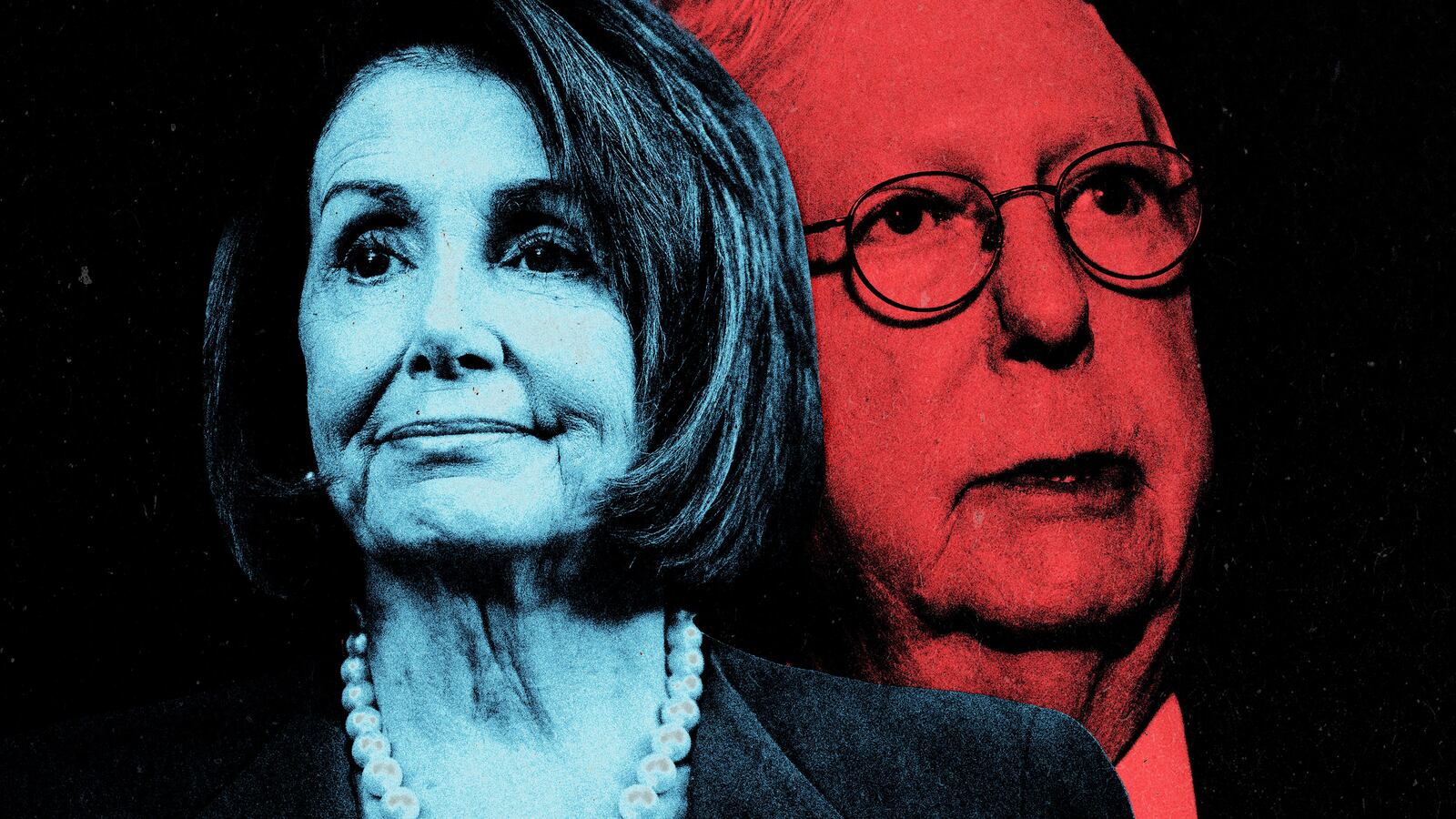Establishment elites may not be popular, but they get shit done. And my unpopular hot take is that we need more of them to win elections, not to mention to grease the gears running our governmental machine.
Recent events underscore this reality. Yet, take a close look at how the two major parties treat their elites. Are they vilified or celebrated? Look no further than the difference between how Republicans are treating Senate Minority Leader Mitch McConnell and how Democrats are treating outgoing Speaker of the House Nancy Pelosi.
On the heels of passing the baton to a new generation of Democrats, Pelosi’s official portrait was unveiled this week in the U.S. Capitol. She was feted and celebrated. Former President Barack Obama recorded a message saying that “she will go down as one of the most accomplished legislators in the country.” Meanwhile, after fending off a leadership challenge from Sen. Rick Scott of Florida, McConnell is taking heat from House Republicans calling him a “sellout” for supporting a year-long budget deal that would avoid high-stakes battles and possible government shutdowns (or worse) in the new year.
Pelosi and McConnell are the two most effective leaders of their respective chambers in the last 40-plus years, yet many ideologues and populists on both sides consider them to be establishment hacks. Pelosi, at least, is being treated with a modicum of dignity by her party. Meanwhile, McConnell can’t get no respect from his.
According to a new survey from Monmouth University, McConnell “is the least popular of the four [congressional] leaders,” with just a quarter of his fellow Republicans approving of his performance.
Pelosi’s numbers make more sense. Even though only 29 percent of American adults approve of her performance, she earns “an overwhelmingly favorable 69 percent [approval] from Democrats.”
I’ve long been confused about the internecine disdain for McConnell. For years, conservatives were told that the ability to nominate and confirm Supreme Court justices who would overturn Roe v. Wade was the raison d'être for Republican politicians. Well, Sen. McConnell is more responsible than anybody for confirming the conservative judges who overturned Roe. Meanwhile, that gets him no purchase in a political party that reviles adult leadership. Nor do his efforts to elect fellow Republicans.
Despite the fact that Donald Trump endorsed most of the Republican nominees in targeted races, and despite the fact that Sen. Rick Scott ran the campaign arm of the Republican Senate, McConnell-aligned super PACs spent hundreds of millions of dollars trying to help Republicans win elections in 2022. As McConnell correctly pointed out, Trump-fueled “candidate quality” problems probably cost Republicans control of the Senate in 2022. Yet, some prominent figures on the right had the audacity to blame McConnell for the losses.
Now, McConnell is attempting to do Kevin McCarthy a favor by clearing the deck and avoiding budget showdowns and shutdowns while McCarthy gets his bearings in 2022. Not only are these examples of high-stakes budget brinkmanship dangerous, they almost always redound to hurt Republicans politically (something McConnell is keenly aware of).
Of course, the reason for not wanting to do a year-long budget deal is ostensibly because House Republicans want leverage to force budget cuts. Keep in mind that during the Trump era, Republicans spent money like drunken sailors. Suddenly, though, the green eyeshades have appeared and fiscal conservatism is back in vogue. Perhaps if Republicans had listened to McConnell (instead of Trump) these last two years, Republicans would be in a better position to cut the budget on their own terms?
Being a congressional leader means knowing (as Kenny Rogers might say) “when to hold ’em and when to fold ’em”. It is inevitable that a pragmatic congressional leader—even one who shares your philosophical values and public policy preferences—will be accused of being insufficiently committed to ideological purity. Pelosi, for example, never gave Democrats single payer health care, and she refused to cut funding for the Iraq War (going along with that, in return for minimum-wage funding). Pelosi played the game, too, but she wasn’t punished for it the way McConnell is.
On the other hand, Pelosi—like McConnell—got stuff done for her side. “Just last week, she helped keep marriage equality, the law of the land and even after insurrectionists literally broke into her office,” said Obama during his recorded tribute. Pelosi was able to deliver on more, partly because she was able to control her caucus.
Democrats have mostly taken this type of disciplined leadership in stride, while Republicans utterly reject the notion that some elite establishment figure might know more than they do about winning. This is consistent with the conspiratorial mindset on today’s right that reflexively distrusts experts instead of embracing them.
The truth is that competence and leadership are philosophically neutral. Assuming Republicans want to pass their increasingly populist and nationalistic ideas via the democratic process (which is, admittedly, a big assumption), doing so in a strategically sagacious manner does not automatically constitute “selling out.”
It strikes me that if the populists on the right and left wanted to win more, they would listen to (and learn from) so-called establishment elites like Pelosi and McConnell. With a few exceptions, Dems largely did that, and it has served them well.
The perception that McConnell is a RINO seems absurd. He wants to win. Republicans should try that sometime.









